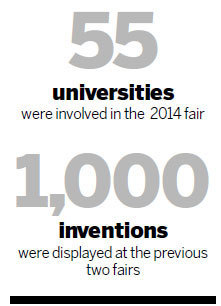Inventions for everyday life, such as smartphone apps, a balcony vegetable planter and an innovative envelope, attracted huge attention from visitors at the third Beijing college student innovative product and patent exhibition and promotion fair.
The event, which was organized by seven government organizations including the Beijing Intellectual Property Office and the Beijing Zhongguancun Administration Committee, was held from Dec 6 to 7 at Beijing University of Civil Engineering and Architecture.
This year's fair offered 536 patents, creative products and academic papers from 55 universities in Beijing, Tianjin and Hebei province. They covered fields including new materials, advanced manufacturing, consumer electronics and aerospace technology.
Zhou Lijun, deputy head of the Beijing Association for Science and Technology, told Beijing Daily that as an event organizer he hoped that the fair would "inspire students' innovation capacity and broaden their employment channels".
The event's first two sessions displayed nearly 1,000 innovative products from 41 Beijing universities and resulted in six cooperative agreements between students and companies.
A smartphone app called Forty Thousand Kilometers took the spotlight during the event, Beijing Daily reported.
The app was developed by a group of undergraduates led by an MBA student, Qiu Zhiqiang, at the China University of Geosciences. It provides Chinese people with information on tourism, schools, restaurants and hotels in foreign countries.
The app covers 22 countries and regions that are popular with Chinese travelers and includes about 1.3 million reviews by tourists and students of more than 510,000 brands.
The app users can view comments from popular social networks such as Tripadvisor, Yelp, Facebook and Twitter and its real-time translation feature can translate 40 foreign languages into Chinese in seconds.
"The equatorial circumference of the globe is about 40,000 km long, and we hope the app can serve the Chinese people around the world. That's how it got its name," Li Qun, one of the app's developers, told Beijing Daily.
The app's website receives more than 100,000 clicks a day and viewers come from more than 200 nations and regions across the world.
In September, the app received a 10 million yuan ($1.62 million) angel investment.
At the event four investment institutions and individuals also wanted to invest in the project and many exhibitors looked to establish cooperative relations.
Li said the group was hoping to find travel agencies and education service providers to cooperate with them.
"We are currently not looking for money, but partners," he said.
Li said the fair was an opportunity for students to directly communicate with companies, which he said was helpful to promote patent commercialization.
Zhang Yan, a student at the Beijing University of Agriculture, exhibited an envelope that can be used to grow plants.
The components of his invention were simple as they just involved some cotton and flower seeds in a waterproof envelope. On the left of the envelope a dotted line indicates where a cut should be made and by following folding instructions a small flowerpot can be created to plant seeds in.
Zhang said the cotton provided nutrition for the seeds, which just need water.
Students from the PLA Academy of Armored Forces Engineering displayed a motorcycle-like bicycle that eases the burden on leg muscles and joints when pedaling up and down slopes.
Other exhibits included an underwater robot and a brainwave-controlled smart car.
[email protected]

